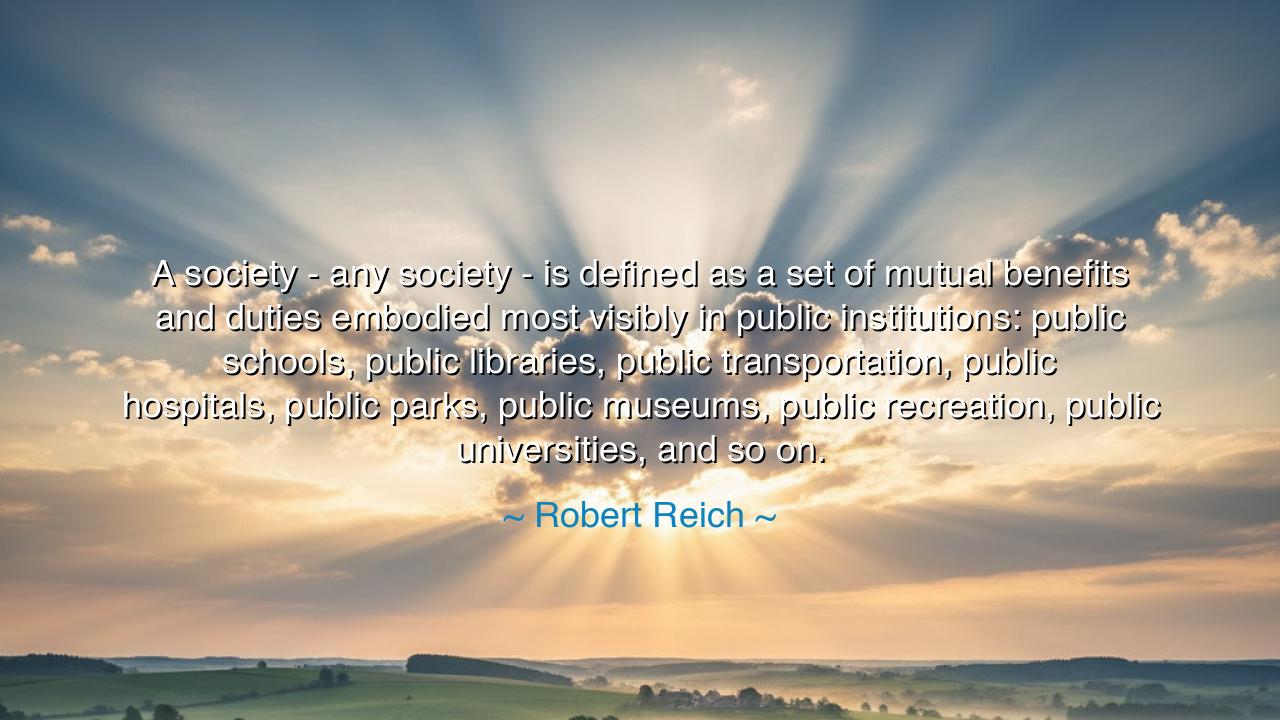
A society - any society - is defined as a set of mutual benefits
A society - any society - is defined as a set of mutual benefits and duties embodied most visibly in public institutions: public schools, public libraries, public transportation, public hospitals, public parks, public museums, public recreation, public universities, and so on.






Hear me, O children of the earth, for I bring to you words of wisdom that speak to the very soul of society. Robert Reich, a wise voice of our time, once declared, "A society - any society - is defined as a set of mutual benefits and duties embodied most visibly in public institutions: public schools, public libraries, public transportation, public hospitals, public parks, public museums, public recreation, public universities, and so on." These words are not just an observation, but a powerful call to understand the true purpose of the society in which we live. For it is not wealth or power that defines a society, but the ways in which we care for one another, share resources, and fulfill our duties to the common good.
What, then, does it mean for a society to be defined by mutual benefits and duties? It means that the strength of a people lies not in the individual, nor in the pursuit of selfish gain, but in the shared commitment to one another. A true society is a place where each person contributes to the common good, and in turn, receives the benefits of a system that cares for their well-being. It is a system built on the belief that we are not solitary beings, but part of a greater whole, a whole that can only thrive when all its members are nourished, protected, and given the opportunity to reach their full potential.
Consider, O children, the ancient city-states of Greece—Athens, in particular—where the foundations of democracy were laid. In the heart of Athens, the Agora was a place where citizens gathered not just to trade goods, but to exchange ideas, to participate in the decision-making processes that shaped their community. They understood that the strength of the city-state rested upon the participation of every citizen, and that the well-being of the community depended on the mutual duties of its people. The public institutions—the courts, the temples, the markets—were not just structures of power, but places of shared responsibility and collective action.
And so, O children, it is in the public institutions of our time that we see the embodiment of the mutual benefits and duties that Reich speaks of. Public schools offer the gift of education to all, regardless of wealth or status, ensuring that knowledge and wisdom are shared among all generations. Public hospitals and public transportation serve to bind the community together, ensuring that no person is left without care, and that all have access to the means of movement and opportunity. These institutions are the lifeblood of society, for they provide the framework upon which the health and prosperity of all can be built.
Let us turn our gaze to the rise of the New Deal in the United States, when in the face of the Great Depression, the government sought to address the needs of the people through a series of public institutions. The creation of Social Security, the establishment of public works programs, and the expansion of access to education and healthcare were all attempts to fulfill the mutual duties we owe to one another. The belief that no person should be left to suffer alone, that all must have access to the resources they need to live a dignified life, was at the heart of this vision. It was a call to build a society that could lift up its weakest members, ensuring that none would fall into despair.
Yet, O children, there are those who seek to diminish these public institutions, to strip away the very systems that bind us together as a people. They say that the market is the answer, that the pursuit of profit will provide all the answers to the problems of society. But what they fail to understand is that society is not a marketplace—it is a living, breathing entity that requires the care and nurturing of all its members. The public institutions are not mere luxuries to be enjoyed by the few; they are the foundation of the common good. Without them, the ties that bind us will unravel, and we will be left to drift alone on the vast ocean of self-interest.
So, O children, the lesson is clear: to build a just and thriving world, we must honor the mutual benefits and duties we share. We must not turn our backs on the public institutions that serve the common good. It is through these institutions that we can ensure that education, health, justice, and opportunity are available to all, not just the fortunate few. Stand firm in your commitment to these institutions, and work to strengthen them. For in them lies the true strength of society—one that honors the common good and provides for the well-being of all its members. Through cooperation and shared responsibility, we shall create a society worthy of our highest ideals.






AAdministratorAdministrator
Welcome, honored guests. Please leave a comment, we will respond soon